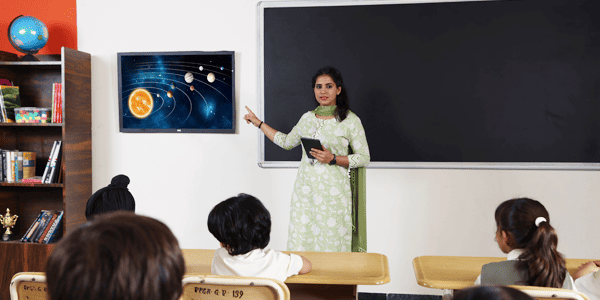Tailored Primary Science Tuition Singapore for Your Child’s Success
Tailored Primary Science Tuition Singapore for Your Child’s Success
Blog Article
A Comprehensive Guide to the Numerous Knowing Approaches in Primary Science Instruction
The exploration of varied learning techniques in main science instruction provides an opportunity for instructors to improve trainee engagement and comprehension substantially. By checking out hands-on discovering strategies, inquiry-based approaches, and joint strategies, we can identify efficient methods that provide to numerous discovering designs.

Hands-On Learning Techniques
Hands-on discovering strategies play a critical function in primary science guideline, engaging students in active exploration and testing. These approaches enable students to engage directly with materials and phenomena, fostering a deeper understanding of clinical ideas. By utilizing manipulatives, designs, and real-life experiments, educators produce an atmosphere where pupils can observe, hypothesize, and evaluate their ideas.
Such techniques not only improve comprehension yet likewise grow vital thinking and analytic abilities. When trainees take part in tasks like building basic machines, growing seeds, or carrying out chain reactions, they are urged to ask inquiries and look for answers with their very own monitorings. This experiential method assists to demystify complex scientific principles, making them a lot more accessible and relatable.
Additionally, hands-on understanding promotes partnership amongst peers, as trainees typically work in teams to carry out experiments or share searchings for. This synergy not just enriches their learning experience but additionally establishes important social skills. Eventually, integrating hands-on strategies in key science direction promotes a lifelong love of discovering and curiosity concerning the natural globe, laying a strong foundation for future academic searches in science and beyond.
Inquiry-Based Discovering
Inquiry-based knowing is a training technique that urges students to ask questions, investigate phenomena, and build their own understanding of scientific ideas. This method moves the emphasis from traditional teacher-led guideline to an extra student-centered experience, where learners take the campaign in their academic journey. By promoting inquisitiveness, inquiry-based knowing promotes much deeper interaction with the product, permitting trainees to explore topics in a meaningful context.
In technique, this technique often includes hands-on experiments, monitorings, and crucial thinking activities that straighten closely with the scientific approach. Pupils are encouraged to develop theories, layout examinations, and examine data, which grows important abilities such as analytic and logical reasoning. The duty of the educator in this framework is to assist in expedition, assisting trainees via the questions procedure while motivating independent idea and partnership.
Furthermore, inquiry-based learning nurtures a sense of ownership over the understanding process, encouraging students to seek knowledge proactively. This method not just improves understanding of scientific concepts however also cultivates a lifelong love for discovering, gearing up pupils with the abilities essential to browse a significantly intricate world.
Collaborative Learning Approaches
Joint learning techniques empower trainees to involve in purposeful communications with peers, cultivating a common responsibility for their educational outcomes. In key science instruction, these methods urge students to function together to discover scientific principles, address problems, and perform experiments (primary science tuition Singapore). By joining group tasks, trainees can take advantage of varied point of views, enabling richer understanding and retention of scientific knowledge
One trick element of collaborative discovering is the focus on interaction abilities. Pupils have to verbalize their thoughts, listen proactively to others, and discuss ideas, every one of which are critical expertises in both real-world and academic contexts. This social interaction not just boosts their understanding of scientific principles but likewise promotes synergy and problem resolution abilities.
When trainees see the worth of their contributions within a team, they are more likely to take possession of their discovering trip. On the whole, integrating collective learning approaches in primary scientific research direction cultivates a dynamic learning environment that prepares trainees for future scholastic and social difficulties.
Modern Technology Assimilation in Scientific Research
The combination of technology in primary scientific research guideline improves discovering experiences by giving ingenious tools and sources that support various training methodologies, including collaborative learning - primary science tuition Singapore. Making use of digital systems, simulations, and interactive applications permits pupils to engage deeply with clinical concepts, helping with a more hands-on technique to understanding
Online labs, for circumstances, enable learners to carry out experiments securely and effectively, promoting inquiry-based learning. These devices can simulate real-world clinical situations, allowing students to visualize complex processes that would certainly be challenging to duplicate in a traditional classroom setting. Additionally, innovation cultivates interaction and cooperation among trainees, as they can share searchings for and collaborate on tasks with on-line platforms.
Additionally, multimedia presentations and academic videos can enrich lessons by satisfying varied knowing styles, making abstract concepts much more available. Data evaluation devices additionally equip students to accumulate go to this web-site and translate clinical information, enhancing crucial thinking abilities. In general, the critical incorporation of modern technology in primary science guideline not just boosts interaction however also prepares trainees for a highly advanced culture, furnishing them with necessary skills for future clinical endeavors.
Differentiated Direction Strategies
Differentiated instruction approaches are crucial for resolving the diverse requirements of students in primary science education. These methods allow educators to tailor their training approaches to suit differing capabilities, rate of interests, and finding out designs within the class. By utilizing distinguished direction, educators can create a comprehensive atmosphere that cultivates browse this site involvement and enhances understanding of scientific principles.
One efficient approach is to use adaptable grouping, which allows pupils to team up with peers at comparable ability levels or with varying point of views. This method motivates peer learning and advertises essential reasoning. In addition, providing choices in tasks can empower students, permitting them to select jobs that resonate with their rate of interests while still meeting curricular objectives.
Additionally, integrating tiered assignments is an additional valuable strategy. Deliberately jobs with differing degrees of complexity, educators can make sure that all pupils are appropriately tested, no matter of their effectiveness. Utilizing formative evaluations to evaluate understanding additional enables educators to readjust their training methods dynamically, making sure that each student obtains the assistance they need.
Eventually, executing differentiated instruction approaches in key scientific research education and learning not just enhances trainee discovering outcomes however additionally grows a passion for science, preparing students for future scholastic pursuits.

Conclusion
In summary, efficient main scientific research guideline requires a diverse approach that includes hands-on learning, inquiry-based techniques, and joint strategies. The assimilation of modern technology and separated guideline better provides to diverse knowing designs, promoting a setting for expedition and important reasoning. By applying these methods, teachers can boost student involvement and comprehension, inevitably nurturing a long-lasting enthusiasm for scientific research and query. Such detailed techniques are important for developing informed and curious future scientists.
The exploration of varied discovering techniques in primary science direction offers an opportunity for teachers to improve trainee engagement and understanding substantially.Hands-on discovering techniques play a critical function in main scientific research guideline, involving students in active exploration and experimentation.Inquiry-based discovering is a training method that encourages trainees to ask concerns, check out sensations, and construct their own understanding of scientific principles.Collective learning strategies equip pupils to engage in significant interactions investigate this site with peers, cultivating a common responsibility for their educational outcomes. In general, including collective knowing techniques in key scientific research instruction grows a dynamic understanding setting that prepares students for future academic and social obstacles.
Report this page